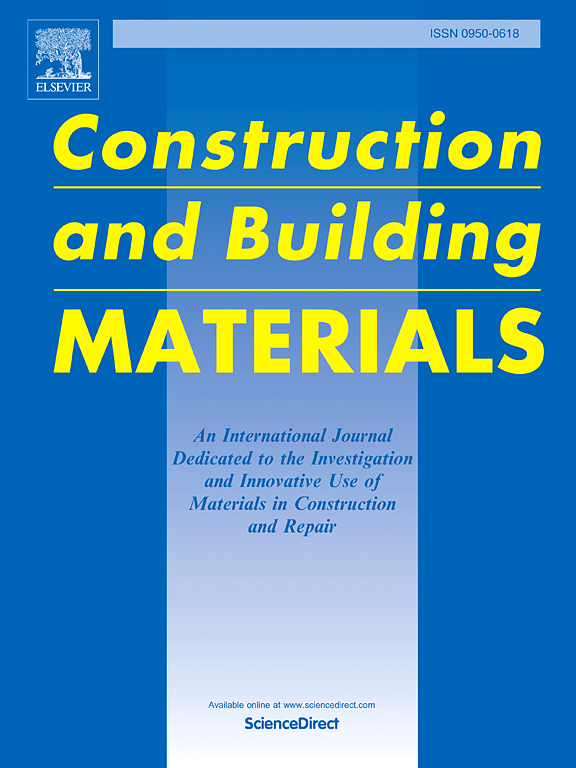基于分形理论的硫酸盐冻融耦合条件下风化砂混凝土毛细吸水特性研究
IF 8
1区 工程技术
Q1 CONSTRUCTION & BUILDING TECHNOLOGY
引用次数: 0
摘要
以内蒙古为代表的西北地区沙漠资源丰富,合理利用风化砂(AS)作为细骨料配制风化砂混凝土(ASC),不仅可以减少土地沙漠化,还可以缓解河砂(RS)资源短缺的问题。同时,内蒙古盐湖较多,导致混凝土结构常伴有盐蚀和冻融循环(FTC)等侵蚀作用。因此,本文进行了硫酸盐冻融循环耦合条件下ASC的毛细吸水率(CWA)试验,分析了不同侵蚀环境(5 %Na2SO4、10 %Na2SO4、5 %Na2SO4+3.5 %NaCl)和AS掺量(0 %、20 %、100 %)对ASC CWA性能的影响。结果表明,在硫酸盐 FTC 的耦合作用下,水分相变和侵蚀产物产生的膨胀应力不断增加,混凝土内部的初始缺陷不断发展,凝胶孔隙和危害较小的孔隙比例逐渐减少,抗压强度、相对动弹性模量(RDEM)和质量逐渐降低,混凝土在复合盐环境中的破坏最为严重。ASC 的 CWA 主要发生在 2 h1/2 之前,初始吸水率(IWAR)和 CWA 深度与冻融破坏程度有很好的相关性。随着 AS 用量的增加,ASC 的累积吸水率和 IWAR 越小。将分形理论应用于孔隙结构,发现分形维数与 IWAR 和破坏程度之间的关系良好,合理增加 50 nm 以下小孔隙的比例更有利于 ASC 的冻融耐久性。本文章由计算机程序翻译,如有差异,请以英文原文为准。
Research on capillary water absorption characteristics of aeolian sand concrete under sulfate freeze-thaw coupling based on fractal theory
Northwest China, represented by Inner Mongolia, is rich in desert resources, and the reasonable use of aeolian sand (AS) as fine aggregate for the preparation of aeolian sand concrete (ASC) can not only reduce land desertification but also alleviate the shortage of river sand (RS) resources. At the same time, more salt lakes in Inner Mongolia lead to concrete structures often accompanied by salt corrosion and freeze-thaw cycle (FTC) and other erosion effects. Therefore, this paper carries out the capillary water absorption (CWA) test on ASC under the coupling of sulphate FTC, and analyses the effects of different erosive environments (5 %Na2SO4, 10 %Na2SO4, 5 %Na2SO4+3.5 %NaCl) and the amount of AS dosage (0 %, 20 %, 100 %) on the CWA performance of ASC. The results show that, under the coupling effect of sulphate FTC, the expansion stress produced by moisture phase change and erosion products increases continuously, the initial defects inside the concrete develop continuously, the percentage of gel pores and less harmful pores decreases gradually, the compressive strength, relative dynamic elastic modulus (RDEM) and mass decrease gradually, and the concrete is damaged most seriously in the composite salt environment. The CWA of ASC mainly occurs before 2 h1/2, and there is a good correlation between the initial water absorption rate (IWAR) and the depth of CWA and the degree of freeze-thaw damage. The cumulative water absorption and the IWAR of ASC became smaller with the increase of AS dosage. By applying the fractal theory to the pore structure, it was found that the relationship between the fractal dimension and the IWAR and damage degree was good, and that a reasonable increase in the proportion of small pores below 50 nm was more favourable to the frost durability of ASC.
求助全文
通过发布文献求助,成功后即可免费获取论文全文。
去求助
来源期刊

Construction and Building Materials
工程技术-材料科学:综合
CiteScore
13.80
自引率
21.60%
发文量
3632
审稿时长
82 days
期刊介绍:
Construction and Building Materials offers an international platform for sharing innovative and original research and development in the realm of construction and building materials, along with their practical applications in new projects and repair practices. The journal publishes a diverse array of pioneering research and application papers, detailing laboratory investigations and, to a limited extent, numerical analyses or reports on full-scale projects. Multi-part papers are discouraged.
Additionally, Construction and Building Materials features comprehensive case studies and insightful review articles that contribute to new insights in the field. Our focus is on papers related to construction materials, excluding those on structural engineering, geotechnics, and unbound highway layers. Covered materials and technologies encompass cement, concrete reinforcement, bricks and mortars, additives, corrosion technology, ceramics, timber, steel, polymers, glass fibers, recycled materials, bamboo, rammed earth, non-conventional building materials, bituminous materials, and applications in railway materials.
 求助内容:
求助内容: 应助结果提醒方式:
应助结果提醒方式:


